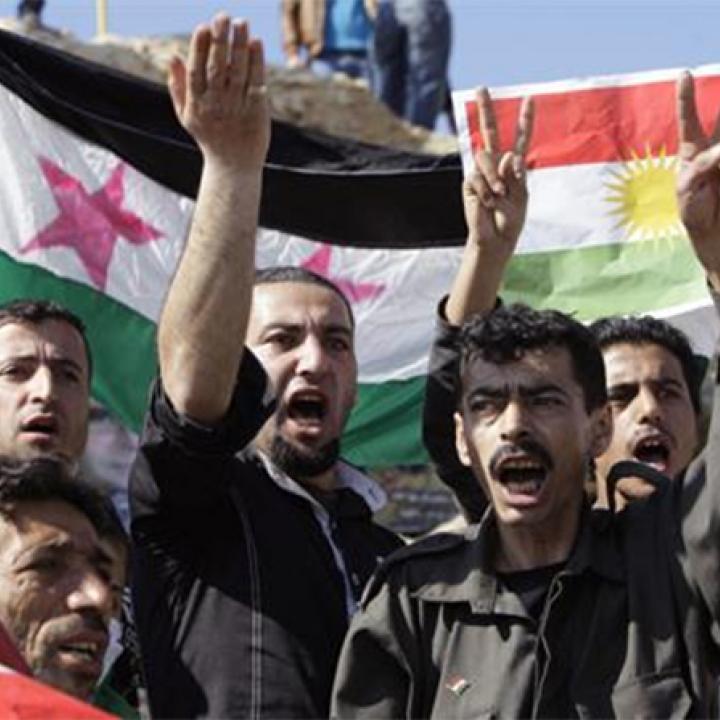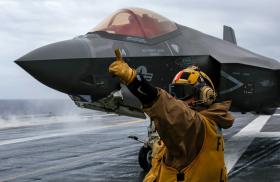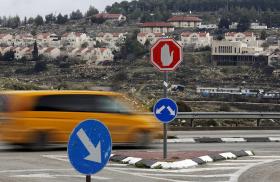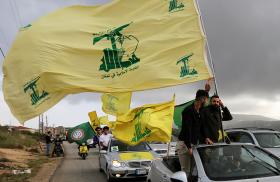
- Policy Analysis
- PolicyWatch 4117
Time to Unify the Kurdish Northeast with the Rest of Syria

Ongoing delays in implementing their integration agreements threaten to derail the entire post-Assad national project, but the Kurds and Damascus don’t need to solve all of their core issues right away—they just need to take a well-defined set of urgent confidence-building steps.
While the interim government in Damascus continues to gain international support, the roadmap that it reached with the Kurdish-led Syrian Democratic Forces (SDF) last March to integrate the northeast has yet to be implemented. U.S. frustration with this delay recently came to light, in part because the Trump administration’s planned drawdown of American forces in Syria has been paused due to concerns over the country’s stability. To help break this impasse, U.S. special envoy Tom Barrack and Central Command chief Adm. Brad Cooper visited northeast Syria and Damascus yesterday before facilitating a meeting between the two sides today, prompting positive statements from Washington and Kurdish officials. Nevertheless, an outbreak of fighting between local Kurdish security forces and government forces in Aleppo—while ended after twenty-four hours by both sides—underlines the risks to the roadmap’s implementation.
Ultimately, the future welfare (and wealth) of the Syrian nation and its people greatly depend on peacefully integrating the northeast. Toward that end, U.S. officials should urge the parties to take urgent steps on reversing the dangerous spike in tensions and instilling mutual confidence about resolving the broader disagreements that have stalled progress for months. To jumpstart this process, the Kurds should go first, taking the right combination of confidence-building steps so that Damascus can feel assured about responding with similar moves (see “Next Steps” below). Importantly, these initial steps do not need to involve core compromises on substantive matters such as security forces, local administration, and cultural issues. For now, the Kurds mainly need to acknowledge the central government’s sovereignty over all of Syria, for a host of reasons discussed in the next section.
Why a United Syria Is So Important
During his appearance at the UN General Assembly last month, President Ahmed al-Sharaa made clear that unifying Syria’s territory is his top priority, along with completely removing international sanctions. His UN debut garnered an extraordinary vote of confidence from international representatives in New York, including a handshake with President Trump and positive comments from Israeli Prime Minister Binyamin Netanyahu on the possibility of an eventual bilateral agreement.
Yet concerns persist, mainly because Damascus has been slow to join the counter-IS coalition or effectively address the crucial post-Assad issues of accountability, security, and inclusivity. For Syria to become a full member of the international community, it needs to do more than charm foreign diplomats—it must secure, stabilize, and improve governance in a country long divided by multiple areas of control and influence.
Indeed, Syrian minority groups appear less convinced of Sharaa’s ability to unite and govern. Notably, most of these groups do not pose an existential threat to national unity or internal stability. For instance, the Druze are vital to future relations with Israel, but their relatively small numbers and geographic spread mean that integrating them is not yet an emergency-level issue. Addressing Alawite issues is less urgent too—despite troubling violence committed by and against this group, they do not control territory, government institutions, or organized forces. Thus, the main preoccupation for Syrian officials seeking to promote unity and stability is the Kurdish-controlled northeast, home to most of the country’s hydrocarbons, much of its arable land, and more than 10 percent of its population, including a mix of Kurds, Arabs, and other groups.
Counterterrorism is another crucial aspect of “the northeast problem.” In the years when IS was on the rise and the Assad regime’s control over Syria was fracturing, the SDF’s progenitors emerged as vital partners in the international coalition fight against the jihadists. Today, the SDF remains Syria’s most effective force against dangerous IS remnants, closely allied with a small but still-indispensable U.S. military presence on the ground. SDF personnel also watch over prisons and camps holding tens of thousands of IS fighters and family members.
At the same time, the SDF and its political leadership in the Democratic Autonomous Administration of North and East Syria (DAANES) have maintained troubling ties with the Kurdistan Workers Party (PKK), a Turkish terrorist group. Although the PKK is currently working to implement a permanent ceasefire with Ankara, the Turkish government sees the SDF’s continued refusal to disarm or integrate into the Syrian military as a potential spoiler in that process. Besides regarding the PKK and SDF as one and the same, Ankara also views the latter’s presence along the border as a security threat given the SDF’s deep combat experience and estimated 100,000 fighters. (The fact that the SDF has largely eschewed combat with Turkey beyond self-defense has done nothing to alter that perception.) Since the March roadmap was announced, Ankara has adopted a “wait and see” approach, letting Sharaa lead on this issue while pressuring him to take a hard line with the Kurds, according to author conversations with senior Kurdish leaders. This patience could wear thin at any point, however—Turkey has already intervened militarily in Syria three times, to forestall what it saw as SDF advances in 2016-19.
What’s the Holdup?
Kurdish officials have repeatedly confirmed their readiness to implement the March roadmap, citing multiple ministerial-level meetings with central government officials. Nothing has really moved, however. To explain the inaction, Kurds point to the post-Assad violence against other minorities (e.g., in Suwayda province), Turkey’s pressure on Damascus to take a tough line, and various government decisions that they perceive as discriminatory toward minorities (e.g., the composition of this week’s provisional legislative elections; the government’s insistence that Syria be formally labeled as an Arab state). Yet deeper differences may prove to be even more of an obstacle.
Under SDF/DAANES leadership, the northeast has been a relative success story in political, security, and economic terms compared to the rest of Syria, so the Kurds have little motivation to embrace an uncertain national future. Furthermore, their values with regard to secularism, socialism, and gender equality are vastly different from the Sharaa government’s worldview—and, it should be noted, from many of the traditional Sunni Arab communities in the territory they control, a situation that has contributed to local friction at times. Following the eruption of violence in various Syrian provinces, Damascus has to show restraint toward minorities and at least meet minimum international standards in considering legitimate requests, including from the Kurds. Yet the necessary national integration will never happen if people expect a war-ravaged Syria to embrace a full-blown liberal social-political system rarely seen elsewhere in the region.
The fact is that a united Syria would be far less susceptible to nefarious actors like Iran and the Islamic State (IS), both of which have frequently targeted undergoverned spaces across Syria. The time has therefore come to accelerate negotiations between DAANES and Damascus.
Next Steps
The U.S. position is clear: it is time to begin Syria’s unification, even while acknowledging concerns about violence against minorities, local language issues, and religious rights. This approach was reflected in the September 16 U.S.-Jordan-Syria plan for maintaining calm in Suwayda, which included international support for de-escalation, accountability, and reconciliation, but “under the framework of Syria’s unity and stability,” as Jordan’s foreign minister put it. Similarly, a senior U.S. official noted in a late September meeting with analysts that if any group is permitted to demand concessions from or resist central authority, the bar will be set for other groups to do the same.
To buy more time for resolving deeper issues—while also maintaining international goodwill, keeping Turkey patient, and building trust with Damascus—Washington should press the Kurds to take the following confidence-building steps as soon as possible:
- Remove non-Syrian forces from the northeast, mainly PKK members serving as administrative or military personnel. This would meet a longstanding Turkish demand while also acknowledging that Damascus has sole authority to approve the presence of such individuals on Syrian soil.
- Formalize in writing the current informal arrangements with Damascus on oil deliveries from the northeast. This would acknowledge the central government’s primary ownership of key national resources without requiring the parties to make any immediate change in deliveries. It would also acknowledge the government’s exclusive right to export Syria’s hydrocarbons.
- Turn over international border crossings to the central government, with arrangements to allow the unimpeded flow of U.S. military supplies. This is an obvious recognition of central sovereign responsibility for any state, and a step taken right next door in northern Iraq by Baghdad, Ankara, and the Kurdistan Regional Government. Doing so would also regularize Syria’s border with Turkey and meet Ankara’s repeated demand to move Kurdish forces away from the immediate frontier region.
- Accelerate negotiations on handing the largely Arab province of Deir al-Zour to Damascus. This step is of particular importance to the central government and would signal that DAANES is not pushing for a large Arab-Kurdish autonomous region.
In return, Washington should encourage Damascus to take immediate steps to alleviate Kurdish and international concerns, focusing on measures related to education, security, and inclusive governance (though future negotiations will address many of these issues more thoroughly). Sharaa’s government should also be expected to acknowledge the important role that the SDF has played in Syria’s fight against IS, as well as the international burden that the SDF has taken on by running prisons and camps holding IS-affiliated nationals from more than sixty countries. As the U.S. decision to pause its military drawdown made clear, Damascus needs to make more concrete progress on efforts to reassure officials—in the northeast and abroad—that it is ready to take on the challenge of securing and stabilizing the country. Such efforts could include the following, each backed by U.S. support and facilitation:
- Join the counter-IS coalition. As President Trump called for during his first meeting with Sharaa last May, Washington should press Syria to formally join the Global Coalition to Defeat IS, with the proviso that Syrian government participation include SDF representation. This could alleviate concerns over shared goals, lead to practical collaboration between Damascus and the northeast, and allow for joint confidence-building measures in areas where both sides work to counter IS.
- Express an interest in taking responsibility for managing IS detention centers. Today, a large part of the counter-IS mission involves maintaining detention camps and other facilities in the northeast. Yet while the United States and Turkey have reiterated their interest in Damascus eventually taking over this task, central government officials failed to attend last week’s high-level UN meeting to discuss al-Hol camp and other facilities. At this point, simply expressing interest in engaging with this process would be a significant step for Damascus. Another helpful step would be implementing a proposal made by Admiral Cooper: to have Syria’s national military and the SDF cooperate on establishing a joint cell for repatriating IS foreign fighters and families to their home countries.
- Join a training and transition program. U.S. funding and resources have long driven the counter-IS mission in Syria, including maintenance of the camps, so Damascus should be ready to join a transitional training and evaluation program under U.S. oversight. As part of this process, Syrian authorities should be encouraged to take advantage of the years of experience that SDF personnel have accumulated on these issues. Select government forces should begin receiving briefings and training on counter-IS operations in the northeast, including practical experience inside detention facilities. By embracing this process and reaching clearly defined benchmarks, Damascus can demonstrate not only its theoretical willingness to carry out this mission, but its practical ability to do so.
James Jeffrey, the Philip Solondz Distinguished Fellow at The Washington Institute, previously served as the State Department’s special envoy to Syria and U.S. ambassador to Turkey and Iraq. Devorah Margolin is the Institute's Blumenstein-Rosenbloom Senior Fellow and an adjunct professor at Georgetown University.




